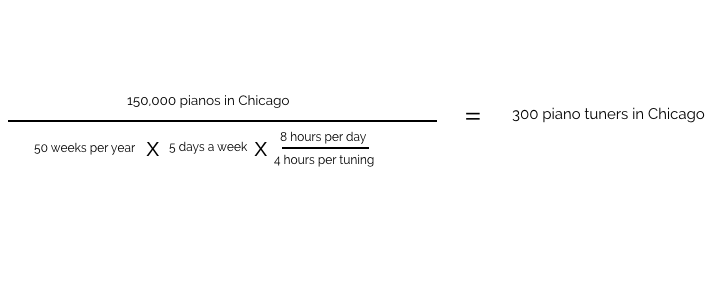Your company did not make as much profit this year as your strategists predicted. Perhaps you had more expenses than you budgeted for or you thought there was a need for your services in the market - only to find your customers don’t really care. Although this isn’t an ideal scenario, you’re definitely not alone. Over 55% of business owners grossly overestimate their revenue, according to a study held by Wells Fargo.
There is an elite group of people known as Forecasters. These individuals have an 80% accuracy rate* in predictions about the economic climate, profit and loss statements, political movements and consumer sentiments. CEOs of large companies pay fortunes to hire them for their insights (if you want to learn more about Forecasters, Thomas Friedman is a great place to start).
Achieving a high accuracy rate is no coincidence; so what do the Forecasters know that you don’t?
Enter Enrico Fermi, Nobel Prize winner and well-known creator of the world’s first nuclear reactor. Fermi was widely recognised for his lessons on the art of guessing and problem solving using deductive reasoning.
The Fermi Principle?
In his lectures, Fermi would pose the following question to his students:
How many piano tuners are there in Chicago?
Before you read any further, have a go (without the aid of Google or any research). If you can figure out the answer, comment below with your process.
How many piano tuners are there in Chicago?
The Fermi Principle is about breaking the question down into smaller estimates that you can multiply. Once you do that, you realise the question is not that testing.
The first question to ask yourself is: How many people live in Chicago? You know that roughly there are 3 million people. But how many of these people live in the same household? Since Chicago is a modern business-district filled with urban-professionals, you can make an educated guess that there would be three people per household. This means there are 1,000,000 households in Chicago.
Pianos are an expensive yet popular musical instrument. We can take another rough guess that 15% of households will own a piano. This means there are 150,000 pianos in Chicago that need tuning.
So how often does a piano need tuning? You don’t hear about it often and it seems like an expensive process so it’s safe to say you’d only tune it once a year.
Now, you should think about how long it takes to tune a piano. Well, they are large instruments so a safe guess would be around four hours including travel time. You should then ask yourself, how many hours does a piano tuner work? It’s a normal job, so a forty-hour week seems like a rational option. A forty-hour week is eight hours per day, five days a week and 50 weeks per year (minus two weeks of annual leave).

So how close did we get? The answer is 290*.
Pretty amazing huh? How did you go?
Systematic Problem Solving
By learning the Fermi Principle, you can make good approximate calculations with little to no data. Fermi applied this problem solving technique when he created the nuclear reactor. Scientists often use the Fermi Principle in problem solving before using more sophisticated techniques.
Scientists aren’t the only ones who employ the Fermi technique. Business owners, such as, Elon Musk, Steve Jobs, Jeff Bezos, Steve Cohen and George Soros are also known to have used the Fermi principle in their business decisions.
Staying Ahead
Apply the Fermi Principle in your business profit projections. You’ll find an increase in accuracy and gain the Forecaster advantage that successful corporations have. No more profit over-optimism and no more underestimated budgets.
Train the people in your company on this technique. It will help you build an army of rational and thorough thinkers. High-level thinking can be a cognitive shock. Habits are formed through repetition, so keep at it.
If you found this article interesting, you might like this one about finding a sustainable competitive advantage.
Written by Lina Lau, Special Projects at Step Change
References
* Superforecasting by Daniel Gardner and Philip E. Tetlock
** Thinking, Fast and Slow by Daniel Kahneman












